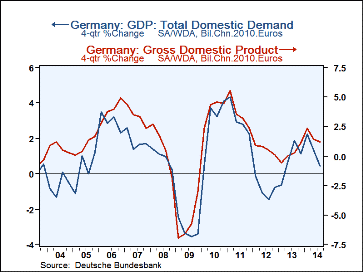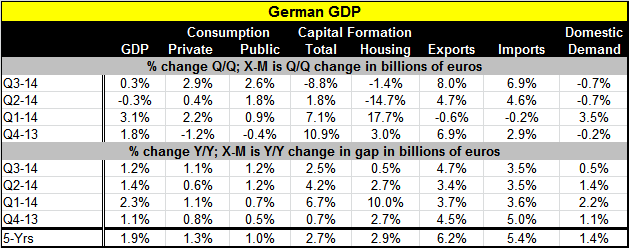 Global| Nov 25 2014
Global| Nov 25 2014Finalized GDP in Germany, the Vampire Economy
Summary
The German economy in the third quarter posted weak growth. GDP rose by 0.3% in Q3 2014 after a 0.3% decline in Q2. So Germany has escaped the clutches of recession. Still, the German economy isn't doing well as recent growth rates [...]
 The German economy in the third quarter posted weak growth. GDP rose by 0.3% in Q3 2014 after a 0.3% decline in Q2. So Germany has escaped the clutches of recession. Still, the German economy isn't doing well as recent growth rates tell.
The German economy in the third quarter posted weak growth. GDP rose by 0.3% in Q3 2014 after a 0.3% decline in Q2. So Germany has escaped the clutches of recession. Still, the German economy isn't doing well as recent growth rates tell.
In Q4 2013, the year-over-year GDP growth rate was 1.1%. It rose up to 2.3% in Q1 2014, edged down to 1.4% in Q2, and now, in Q3, it is back down to 1.2%. This is weak growth. Private sector growth in Germany is hovering below 1% (year-over-year) over the last four quarters, at least. The five-year average for this growth rate is only 1.3%.
German exports continue to try to help growth and at 4.7%. Germany has the strongest year-over-year growth rate in exports in three years! And because import growth has slipped (lowest in five quarters), exports are continuing to help domestic demand and to make trade a net contributor to GDP growth.
Still, overall domestic demand remains weak as a combination of weak private sector consumption and weak capital formation adversely impact domestic demand. Domestic demand has fallen for two straight quarters and in three quarters out of the last four. On that score, Germany would be judged to be in recession, but its international sector has helped to give it a boost.
Even the year-over-year private sector growth rates for GDP are hovering around 1%. Domestic demand is in much worse shape as it has slipped only 0.5% growth year-over-year in the third quarter. Domestic demand growth has averaged 1.4% over the last five years. For now it has slipped to 0.5%, just about one-third of what has been a very weak performance by domestic demand. This is very poor indigenous strength.
The chart depicts German GDP growth against domestic demand. GDP has been outpacing domestic demand through most of this recovery phase as Germany has relied on net exports to boost GDP. In the current quarter domestic demand is falling very fast only German trade performance is holding GDP in line.
For the moment it is the rest of the European Union, and the rest of the world, that is keeping Germany afloat. Germany is leaning heavily on the domestic demand created outside of Germany. This is the fuel for German output. German competitiveness is substantial and is being made better every day by the continued weakness in the euro. This assures Germany of the lifeline of continued good trade performance. And yet, Germany's domestic demand is still lacking as Germany feeds on demand growth from abroad. Germany, far from being the engine of growth for Europe, has become the vampire economy sucking life out of the rest of the world to sustain itself and to fuel its own growth.

Robert Brusca
AuthorMore in Author Profile »Robert A. Brusca is Chief Economist of Fact and Opinion Economics, a consulting firm he founded in Manhattan. He has been an economist on Wall Street for over 25 years. He has visited central banking and large institutional clients in over 30 countries in his career as an economist. Mr. Brusca was a Divisional Research Chief at the Federal Reserve Bank of NY (Chief of the International Financial markets Division), a Fed Watcher at Irving Trust and Chief Economist at Nikko Securities International. He is widely quoted and appears in various media. Mr. Brusca holds an MA and Ph.D. in economics from Michigan State University and a BA in Economics from the University of Michigan. His research pursues his strong interests in non aligned policy economics as well as international economics. FAO Economics’ research targets investors to assist them in making better investment decisions in stocks, bonds and in a variety of international assets. The company does not manage money and has no conflicts in giving economic advice.
More Economy in Brief
 Global| Feb 05 2026
Global| Feb 05 2026Charts of the Week: Balanced Policy, Resilient Data and AI Narratives
by:Andrew Cates






